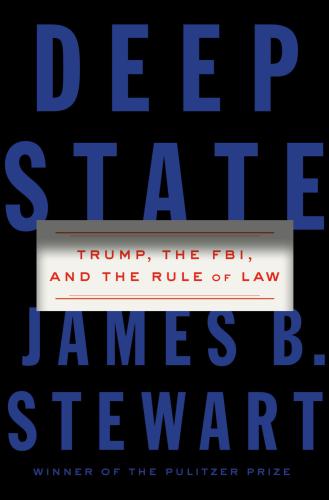
Deep State
Trump, the FBI, and the Rule of Law
کتاب های مرتبط
- اطلاعات
- نقد و بررسی
- دیدگاه کاربران
نقد و بررسی

October 28, 2019
In this rigorous, lucidly written inquiry, New York Times columnist Stewart (Tangled Webs) examines the origins of special counsel Robert Mueller’s investigation into links between Donald Trump’s presidential campaign and Russia’s interference in the 2016 election for evidence that, in Trump’s words, the investigation was “an illegal takedown that failed.” Beginning with the opening of the FBI’s 2015 case on Secretary of State Hillary Clinton for unauthorized use of a private email server, then the surfacing of the “Steele dossier” and President Trump’s dismissal of FBI director James Comey, Stewart efficiently recounts the events that led to Mueller’s appointment, focusing on decisions made by FBI officials including Comey, Andrew McCabe, Peter Strzok, and Lisa Page (all accused of “treason” by Trump). His timeline is studded with revelations—Page initially lied to McCabe about her affair with Strzok; Deputy Attorney General Rod Rosenstein twice offered to secretly record conversations with the president—but Stewart credibly concludes that there was no “deep state” conspiracy. The irony, he contends, is that the FBI’s rigid insistence on preserving its aura of independence “opened the doors to hell,” as Comey has said. Though many details will be familiar to political junkies, this is a must-read for those seeking clear, credible answers to the swirl of accusations surrounding these matters.

Is there a deep state? If there is, writes New York Times columnist Stewart (Tangled Webs: How False Statements Are Undermining America: From Martha Stewart to Bernie Madoff, 2011, etc.), then Donald Trump is definitively a member. James Comey was a good foot soldier for the FBI. Yet, when the 2016 election was heating up, he made one tactical error after another, especially by planting the suggestion that Hillary Clinton had engaged in illicit behavior when using a private server for official emails. We now know that the State Department has exonerated Clinton, but in 2015, the jury was still out. Meanwhile, other actions on the parts of FBI officials were consternating: Andrew McCabe's wife, for instance, was running for office in Virginia as a Democrat and had received a sizable donation from that party, causing a Republican stalwart to fulminate that it could not be interpreted as "anything other than a down payment to influence the FBI's criminal investigation into Hillary Clinton's private email server." After Trump entered office, Comey presented him with uncomfortable evidence linking him to prostitutes--evidence inconveniently videotaped by Russian intelligence. McCabe was not long in falling himself after suggesting that he knew that Trump had lied about his reasons for firing Comey. This is all well known to anyone who followed matters as they were happening, heavily reported in papers. A value added is that Stewart looks closely at questions surrounding the affair, asking whether Comey's actions cost Clinton the election and answering that her "decades of obfuscation...led some voters to doubt Clinton's integrity and truthfulness, including her claims about the emails." Granted, Comey departed from policy by criticizing her handling of the matter while not recommending charges against her. Was Comey a Trump foe, as Trump so loudly complained? No, for the FBI's case file concerned not Trump but, initially, four of his associates who proved to have direct ties to Russia--three of whom "ended up being indicted or pleading guilty to crimes." Covers ground already chronicled in the memoirs of the principals, to say nothing of the Mueller Report--but still worth a look.
COPYRIGHT(2019) Kirkus Reviews, ALL RIGHTS RESERVED. (Online Review)

























دیدگاه کاربران